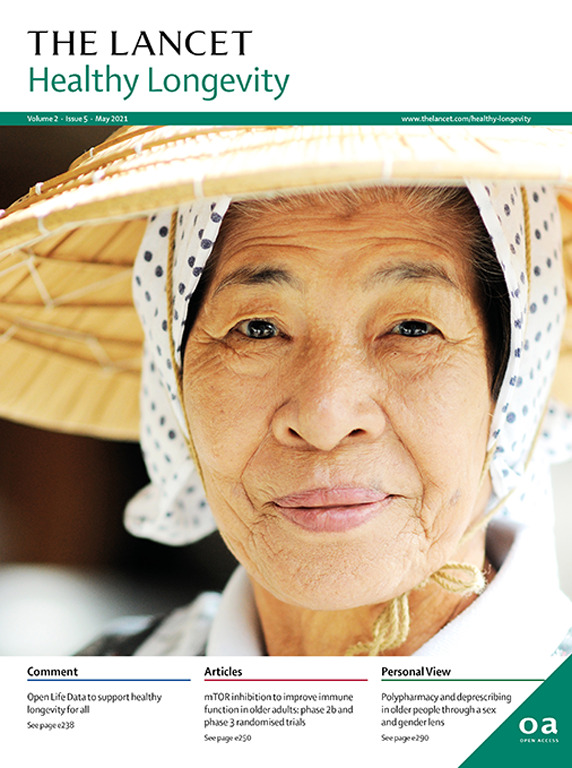阿司匹林与老年人健康寿命:ASPREE-XT观察性研究的主要结果
IF 14.6
Q1 GERIATRICS & GERONTOLOGY
引用次数: 0
摘要
背景:在阿司匹林减少老年人事件(ASPREE)临床试验中,低剂量阿司匹林与无痴呆和持续性身体残疾(健康寿命的一项衡量指标)的生存无关;然而,死亡风险有小幅增加。鉴于许多衰老疾病的临床前阶段较长,我们旨在通过延长ASPREE-XT观察性研究的随访,检查阿司匹林与安慰剂的遗留效应(试验后)和长期效应。方法:在2010年3月10日至2014年12月24日期间,澳大利亚和美国的19114名社区居民,年龄主要为70岁及以上,随机分配低剂量阿司匹林或安慰剂,中位时间为4.7年,作为ASPREE试验的一部分。试验后观察性随访的中位时间为4.3年(IQR为1.4 - 6)。主要终点的所有组成部分(即痴呆事件、持续性身体残疾和死亡)由蒙面专家小组裁决。分析使用带有意向治疗的Cox比例风险模型。结果:15633名参与者(8836名[56.5%]女性,6797名[43.5%]男性,981名[6.3%]非怀特)符合并同意观察性随访。在ASPREE-XT期间,阿司匹林(每1000人年34.37件事件)和安慰剂(每1000人年33.68件事件)的随机化对主要终点没有影响(风险比[HR] 1.02; 95% CI 0.94 - 1.11; p= 0.63)。同样,在ASPREE和ASPREE- xt期间,在近十年的随访中,没有观察到阿司匹林与安慰剂对死亡、痴呆或持续身体残疾的复合结局的长期影响(HR 1.01; 95% CI 0.95 - 1.08; p= 0.65),包括对死亡的长期影响(1.06;0.99 - 1.14;p= 0.10)。在ASPREE-XT中,与安慰剂相比,阿司匹林对大出血事件的发生率没有影响;然而,阿司匹林与ASPREE和ASPREE- xt中发生重大出血事件的风险增加相关(1.24;1.10 - 1.39)。解释:在原本健康的社区老年人中,低剂量阿司匹林似乎不能有效地促进健康的寿命。资助:美国国家老龄研究所和国家癌症研究所。本文章由计算机程序翻译,如有差异,请以英文原文为准。
Aspirin and healthy lifespan in older people: main outcome of the ASPREE-XT observational study
Background
In the Aspirin in Reducing Events in the Elderly (ASPREE) clinical trial, low-dose aspirin was not associated with survival free of dementia and persistent physical disability (a measure of a healthy lifespan); however, there was a small increased risk of death. Given the long pre-clinical phase of many ageing conditions, we aimed to examine the legacy effect (post-trial) and the longer-term effect of aspirin versus placebo through extended follow-up in the ASPREE-XT observational study.
Methods
Between March 10, 2010, and Dec 24, 2014, 19 114 community-dwelling people in Australia and the USA, aged predominantly 70 years and older, were randomly assigned to low-dose aspirin or placebo for a median of 4·7 years as part of the ASPREE trial. Post-trial observational follow-up continued for a median of 4·3 years (IQR 4·1–4·6). All components of the primary endpoint (ie, incident dementia, persistent physical disability, and death) were adjudicated by masked expert panels. Analyses used Cox proportional hazards models with intention-to-treat.
Findings
15 633 participants (8836 [56·5%] were women, 6797 [43·5%] were men; 981 [6·3%] were not White) were eligible for and agreed to observational follow-up. There was no effect of randomisation to aspirin (34·37 events per 1000 person-years) versus placebo (33·68 per 1000 person-years) on the primary endpoint (hazard ratio [HR] 1·02; 95% CI 0·94–1·11; p=0·63) in the ASPREE-XT period. Similarly, over the period of both ASPREE and ASPREE-XT, no long-term effect of aspirin versus placebo was observed on the composite outcome of death, dementia, or persistent physical disability over almost a decade of follow-up (HR 1·01; 95% CI 0·95–1·08; p=0·65), including no long-term effect on deaths (1·06; 0·99–1·14; p=0·10). No effect of aspirin on incident major haemorrhagic events as compared with placebo was found in ASPREE-XT; however, aspirin was associated with an increased hazard for incident major haemorrhagic events across both ASPREE and ASPREE-XT (1·24; 1·10–1·39).
Interpretation
Low-dose aspirin does not appear to be effective in promoting a healthy lifespan in initially healthy, community-dwelling older people.
Funding
National Institute on Aging and the National Cancer Institute (USA).
求助全文
通过发布文献求助,成功后即可免费获取论文全文。
去求助
来源期刊

Lancet Healthy Longevity
GERIATRICS & GERONTOLOGY-
CiteScore
16.30
自引率
2.30%
发文量
192
审稿时长
12 weeks
期刊介绍:
The Lancet Healthy Longevity, a gold open-access journal, focuses on clinically-relevant longevity and healthy aging research. It covers early-stage clinical research on aging mechanisms, epidemiological studies, and societal research on changing populations. The journal includes clinical trials across disciplines, particularly in gerontology and age-specific clinical guidelines. In line with the Lancet family tradition, it advocates for the rights of all to healthy lives, emphasizing original research likely to impact clinical practice or thinking. Clinical and policy reviews also contribute to shaping the discourse in this rapidly growing discipline.
 求助内容:
求助内容: 应助结果提醒方式:
应助结果提醒方式:


